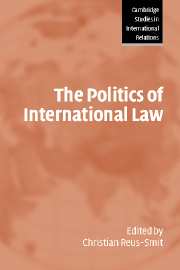Book contents
- Frontmatter
- Contents
- List of contributors
- Preface
- 1 Introduction
- 2 The politics of international law
- 3 When states use armed force
- 4 Soft law, hard politics, and the Climate Change Treaty
- 5 Emerging customary norms and anti-personnel landmines
- 6 International law, politics, and migrant rights
- 7 The International Criminal Court
- 8 The Kosovo bombing campaign
- 9 International financial institutions
- 10 Law, politics, and international governance
- 11 Society, power, and ethics
- Bibliography
- Index
- CAMBRIDGE STUDIES IN INTERNATIONAL RELATIONS
4 - Soft law, hard politics, and the Climate Change Treaty
Published online by Cambridge University Press: 22 September 2009
- Frontmatter
- Contents
- List of contributors
- Preface
- 1 Introduction
- 2 The politics of international law
- 3 When states use armed force
- 4 Soft law, hard politics, and the Climate Change Treaty
- 5 Emerging customary norms and anti-personnel landmines
- 6 International law, politics, and migrant rights
- 7 The International Criminal Court
- 8 The Kosovo bombing campaign
- 9 International financial institutions
- 10 Law, politics, and international governance
- 11 Society, power, and ethics
- Bibliography
- Index
- CAMBRIDGE STUDIES IN INTERNATIONAL RELATIONS
Summary
This chapter offers a critical constructivist interpretation of the legislative phase of international politics and international public law manifest in the treatyümaking process. Drawing in particular on the critical theory of Jürgen Habermas and the constructivism of Alexander Wendt, I seek to show how treaty-making is shaped and constrained, on the one hand by the deeper constitutional structure and associated norms of international society and, on the other hand, by the particular roles, interests, and identities of those state and non-state actors involved in the rule-making process.
Central to the contributions in this volume is the idea that assumptions made about the nature of politics (including the nature of political community) circumscribe understandings of law, while particular kinds of legal order, in turn, shape and constrain the political understandings and practices of social agents. The central problem with neorealist and neoliberal institutionalist approaches is that they not only tend to reduce law to politics but also tend to employ an unduly limited understanding of politics (which is typically reduced to the play of power and/or national interests). Critical constructivists, in contrast, proceed on the basis of a broader conception of politics that encompasses not only questions of material capability and utility but also questions of morality/justice and identity. Moreover, critical constructivists understand the relationship between law and politics as mutually constitutive and mutually enmeshed.
- Type
- Chapter
- Information
- The Politics of International Law , pp. 80 - 105Publisher: Cambridge University PressPrint publication year: 2004
- 4
- Cited by



